The UK Legal System The Court System The

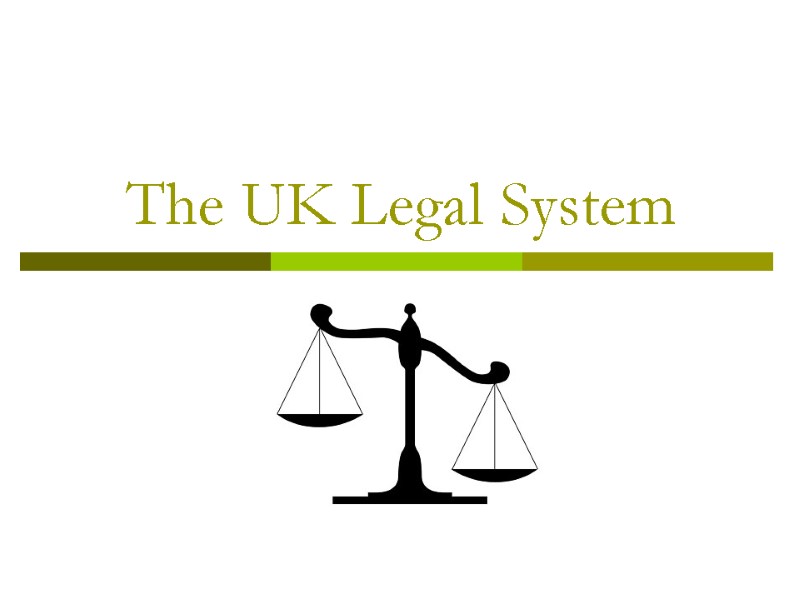
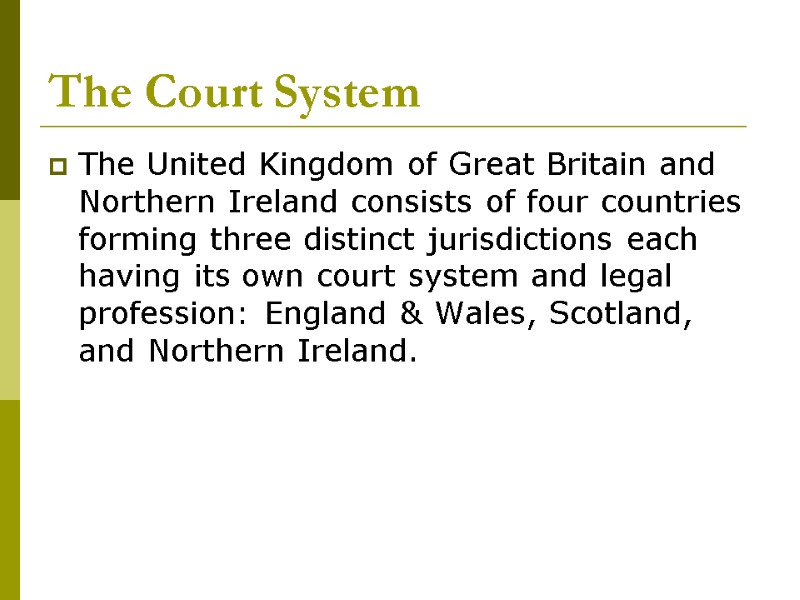
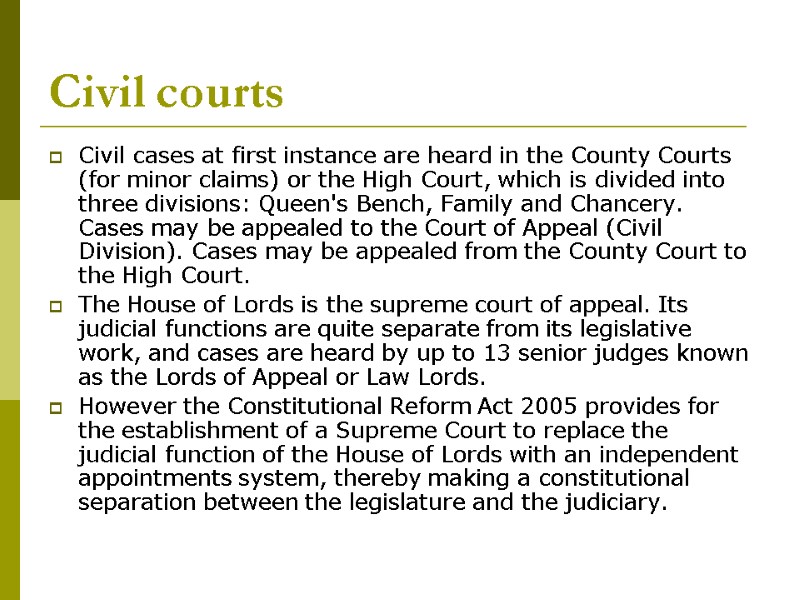
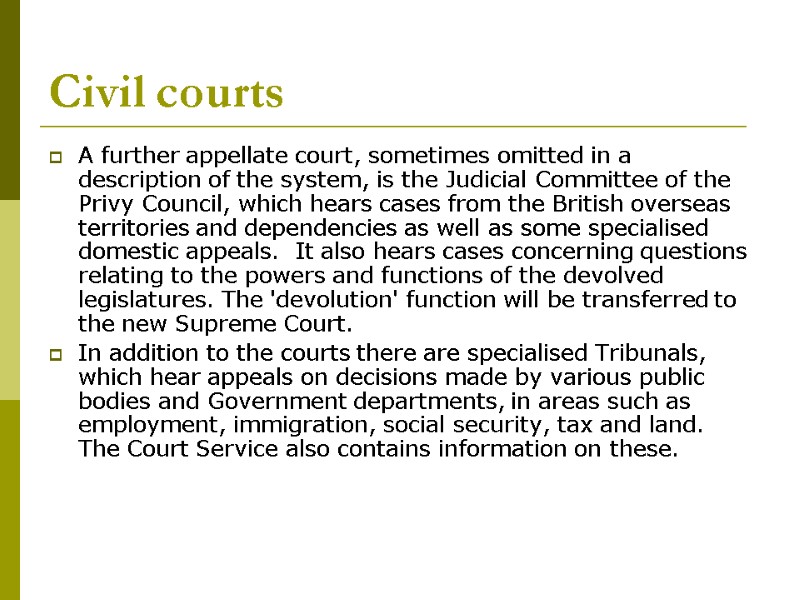
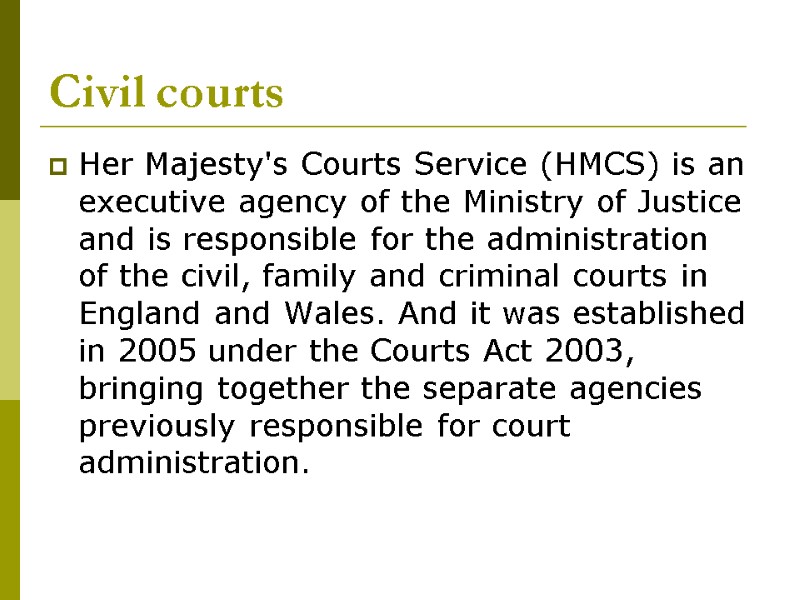
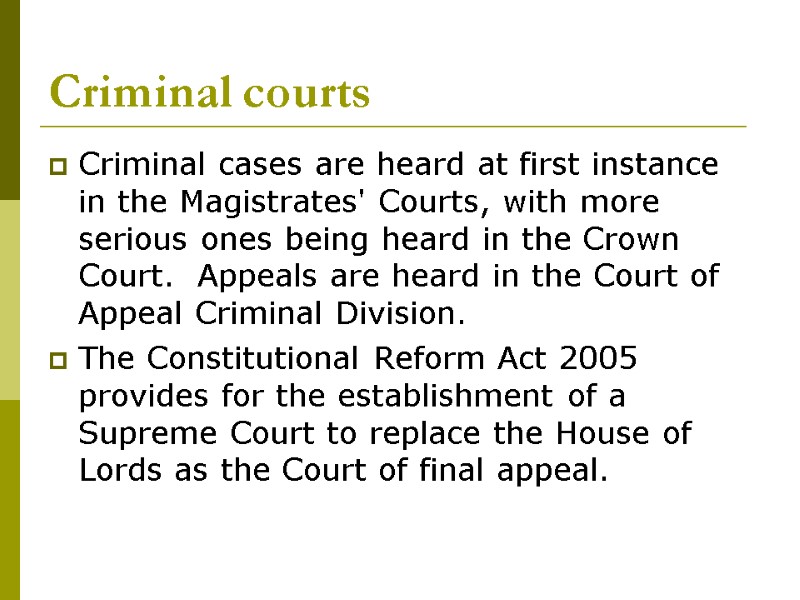
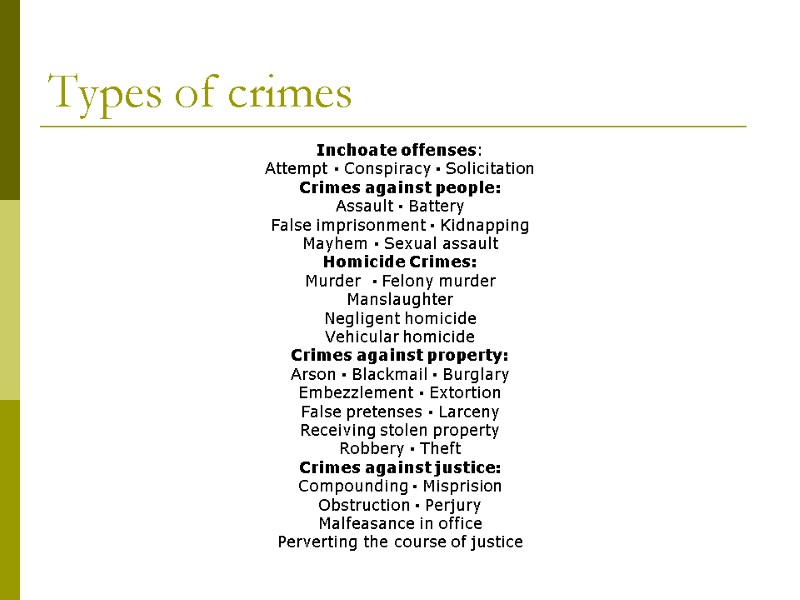
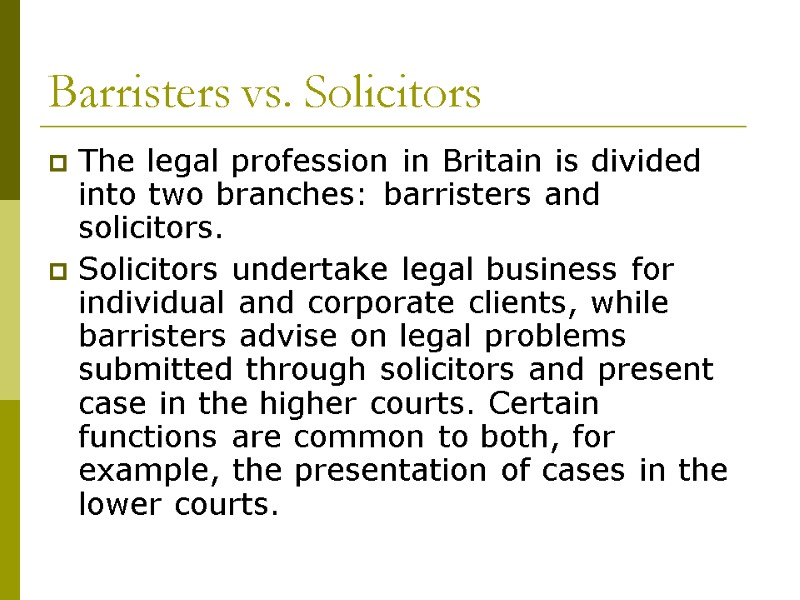
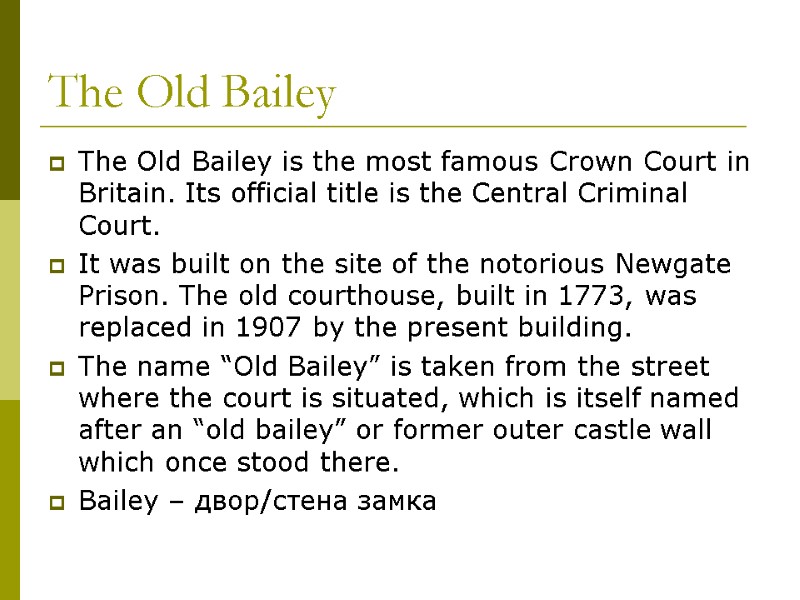
9922-the-uk-legal-system.ppt
- Количество слайдов: 9
 The UK Legal System
The UK Legal System
 The Court System The United Kingdom of Great Britain and Northern Ireland consists of four countries forming three distinct jurisdictions each having its own court system and legal profession: England & Wales, Scotland, and Northern Ireland.
The Court System The United Kingdom of Great Britain and Northern Ireland consists of four countries forming three distinct jurisdictions each having its own court system and legal profession: England & Wales, Scotland, and Northern Ireland.
 Civil courts Civil cases at first instance are heard in the County Courts (for minor claims) or the High Court, which is divided into three divisions: Queen's Bench, Family and Chancery. Cases may be appealed to the Court of Appeal (Civil Division). Cases may be appealed from the County Court to the High Court. The House of Lords is the supreme court of appeal. Its judicial functions are quite separate from its legislative work, and cases are heard by up to 13 senior judges known as the Lords of Appeal or Law Lords. However the Constitutional Reform Act 2005 provides for the establishment of a Supreme Court to replace the judicial function of the House of Lords with an independent appointments system, thereby making a constitutional separation between the legislature and the judiciary.
Civil courts Civil cases at first instance are heard in the County Courts (for minor claims) or the High Court, which is divided into three divisions: Queen's Bench, Family and Chancery. Cases may be appealed to the Court of Appeal (Civil Division). Cases may be appealed from the County Court to the High Court. The House of Lords is the supreme court of appeal. Its judicial functions are quite separate from its legislative work, and cases are heard by up to 13 senior judges known as the Lords of Appeal or Law Lords. However the Constitutional Reform Act 2005 provides for the establishment of a Supreme Court to replace the judicial function of the House of Lords with an independent appointments system, thereby making a constitutional separation between the legislature and the judiciary.
 Civil courts A further appellate court, sometimes omitted in a description of the system, is the Judicial Committee of the Privy Council, which hears cases from the British overseas territories and dependencies as well as some specialised domestic appeals. It also hears cases concerning questions relating to the powers and functions of the devolved legislatures. The 'devolution' function will be transferred to the new Supreme Court. In addition to the courts there are specialised Tribunals, which hear appeals on decisions made by various public bodies and Government departments, in areas such as employment, immigration, social security, tax and land. The Court Service also contains information on these.
Civil courts A further appellate court, sometimes omitted in a description of the system, is the Judicial Committee of the Privy Council, which hears cases from the British overseas territories and dependencies as well as some specialised domestic appeals. It also hears cases concerning questions relating to the powers and functions of the devolved legislatures. The 'devolution' function will be transferred to the new Supreme Court. In addition to the courts there are specialised Tribunals, which hear appeals on decisions made by various public bodies and Government departments, in areas such as employment, immigration, social security, tax and land. The Court Service also contains information on these.
 Civil courts Her Majesty's Courts Service (HMCS) is an executive agency of the Ministry of Justice and is responsible for the administration of the civil, family and criminal courts in England and Wales. And it was established in 2005 under the Courts Act 2003, bringing together the separate agencies previously responsible for court administration.
Civil courts Her Majesty's Courts Service (HMCS) is an executive agency of the Ministry of Justice and is responsible for the administration of the civil, family and criminal courts in England and Wales. And it was established in 2005 under the Courts Act 2003, bringing together the separate agencies previously responsible for court administration.
 Criminal courts Criminal cases are heard at first instance in the Magistrates' Courts, with more serious ones being heard in the Crown Court. Appeals are heard in the Court of Appeal Criminal Division. The Constitutional Reform Act 2005 provides for the establishment of a Supreme Court to replace the House of Lords as the Court of final appeal.
Criminal courts Criminal cases are heard at first instance in the Magistrates' Courts, with more serious ones being heard in the Crown Court. Appeals are heard in the Court of Appeal Criminal Division. The Constitutional Reform Act 2005 provides for the establishment of a Supreme Court to replace the House of Lords as the Court of final appeal.
 Types of crimes Inchoate offenses: Attempt · Conspiracy · Solicitation Crimes against people: Assault · Battery False imprisonment · Kidnapping Mayhem · Sexual assault Homicide Crimes: Murder · Felony murder Manslaughter Negligent homicide Vehicular homicide Crimes against property: Arson · Blackmail · Burglary Embezzlement · Extortion False pretenses · Larceny Receiving stolen property Robbery · Theft Crimes against justice: Compounding · Misprision Obstruction · Perjury Malfeasance in office Perverting the course of justice
Types of crimes Inchoate offenses: Attempt · Conspiracy · Solicitation Crimes against people: Assault · Battery False imprisonment · Kidnapping Mayhem · Sexual assault Homicide Crimes: Murder · Felony murder Manslaughter Negligent homicide Vehicular homicide Crimes against property: Arson · Blackmail · Burglary Embezzlement · Extortion False pretenses · Larceny Receiving stolen property Robbery · Theft Crimes against justice: Compounding · Misprision Obstruction · Perjury Malfeasance in office Perverting the course of justice
 Barristers vs. Solicitors The legal profession in Britain is divided into two branches: barristers and solicitors. Solicitors undertake legal business for individual and corporate clients, while barristers advise on legal problems submitted through solicitors and present case in the higher courts. Certain functions are common to both, for example, the presentation of cases in the lower courts.
Barristers vs. Solicitors The legal profession in Britain is divided into two branches: barristers and solicitors. Solicitors undertake legal business for individual and corporate clients, while barristers advise on legal problems submitted through solicitors and present case in the higher courts. Certain functions are common to both, for example, the presentation of cases in the lower courts.
 The Old Bailey The Old Bailey is the most famous Crown Court in Britain. Its official title is the Central Criminal Court. It was built on the site of the notorious Newgate Prison. The old courthouse, built in 1773, was replaced in 1907 by the present building. The name “Old Bailey” is taken from the street where the court is situated, which is itself named after an “old bailey” or former outer castle wall which once stood there. Bailey – двор/стена замка
The Old Bailey The Old Bailey is the most famous Crown Court in Britain. Its official title is the Central Criminal Court. It was built on the site of the notorious Newgate Prison. The old courthouse, built in 1773, was replaced in 1907 by the present building. The name “Old Bailey” is taken from the street where the court is situated, which is itself named after an “old bailey” or former outer castle wall which once stood there. Bailey – двор/стена замка

